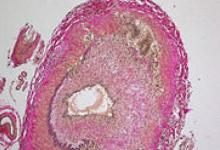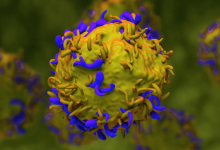Post-Translationally Modified Proteins as Potential New Early Arthritis Activity Markers Save
Defects in protein citrullination and its consequences in patients with RA have been studied widely in the recent decade. It appears that autoantibodies, including those against citrullinated proteins, are of diagnostic and prognostic relevance.
Patients who test positive for anti-CCP antibodies tend to have more aggressive disease course and poorer prognosis. Apparently, citrullination is not the only post-translational modification process that may play role in pathogenesis of RA. Anti-carbamylated protein (anti-CarP) antibodies are the product of carbamylation, wherein lysine is converted to homocitrulline - usually driven by myeloperoxidase and inflammation. Anti-CarP antibodies are present in 33-43% RA patients and generally do not overlap with ACPA. Like ACPA, CarP antibodies can be found during "pre-clinical" RA and they appear to play a prognostic role.
A group of researchers from the University of Birmingham recently studied serum samples from 268 patients with early arthritis, looking for serum antibody reactivity against a panel of post-transnationally modified vimentin peptides.
Antibodies against citrullinated, carbamylated and acetylated vimentin peptides were detected in the sera of patients with early inflammatory arthritis. Results of the study showed 68.7% of anti-CCP-positive and 3% of anti-CCP-negative patients with RA have anti-CarVimentin antibodies.
These findings suggest carbamylation and acetylation, along with citrullination, may play important role in the pathogenesis of RA by triggering the generation of autoantibodies, often months or years before the onset of symptoms. These antibodies may become a new diagnostic or prognostic markers in early RA.










If you are a health practitioner, you may Login/Register to comment.
Due to the nature of these comment forums, only health practitioners are allowed to comment at this time.